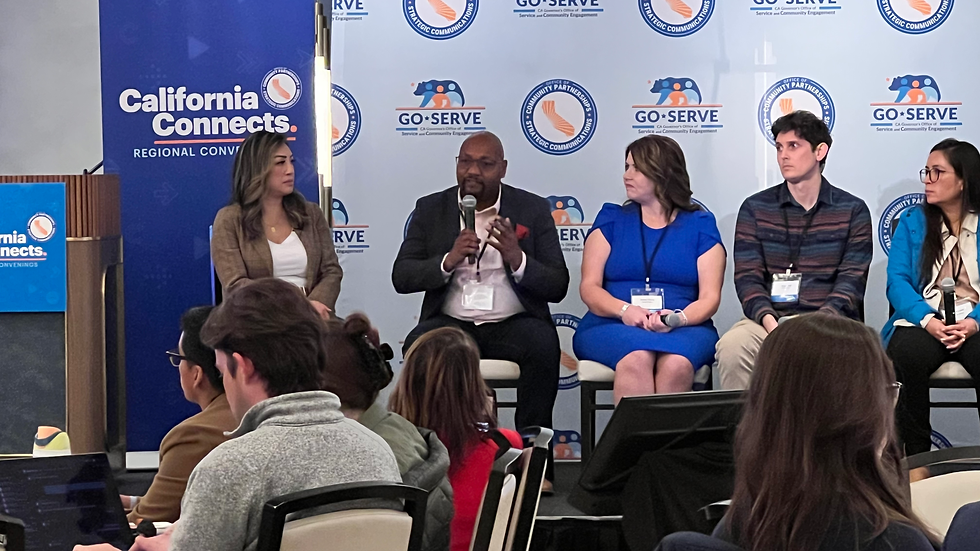California launches progressive campaign to inform vulnerable communities about emergency safety
- The ONME Newswire

- Aug 19, 2020
- 3 min read
Updated: Sep 14, 2020
By SUNITA SOHRABJI/EMS Contributing Editor
Edited by and Video Production by ONME Newswire
Listos California—a disaster preparedness campaign based in the Governor’s Office of Emergency Services – has launched a new program aimed to help the state’s most vulnerable populations to ready themselves for sudden disasters.
Responding to the rapidly-increasing propensity of wildfires and floods, the California state Legislature last August passed AB 72, a $50 million initiative designed to help the state’s residents prepare for natural disasters. The program was initially known as the California for All Emergency Preparedness Campaign, and is now called Listos California.
Listos means “ready” in Spanish.
During a briefing with reporters July 23, organized by Ethnic Media Services, Karen Baker, co-chair of Listos California, announced the campaign’s newest initiative, a text message program which allows users to take a safety preparedness course on their cell phones. Users can text 72345 on their mobile phones, and add listosca in the message. An auto reply asks the user to choose from a drop-down list of several languages. Once enrolled in the program, the user immediately receives a text with a graphic of five basic safety preparedness measures. Over the course of one week, text messages provide more details on preparing for wildfires, earthquakes, and floods.
“People know they need to be prepared, but are scared or think it’s too expensive or time consuming,” said Baker. “So our challenge from the get-go has been to create products and partnerships that can make it affordable, easy, and actually empowering.”
“We care deeply that outreach will reach people where they are,” said Baker, noting that this is the first time any state has used text messaging to train and educate the general public. The course is free and available in English, Spanish, Tagalog, Cantonese, Vietnamese, Korean and Hmong.
Listos California is focused on particularly vulnerable people who may have limited access to information because of language barriers, physical and cognitive disabilities, social isolation, and age. The program has identified 24 regions across the state which are most vulnerable, and has partnered with more than 200 community organizations — including faith-based services — and ethnic media to spread its message of safety preparedness in multiple languages.
The program is implemented through the Governor’s Office of Emergency Services and is chaired jointly by Baker and Justin Knighten.
“Now more than ever, it’s about survival and making sure that people have the information that they need to create a baseline of preparedness,” said Knighten. “Diverse populations have always been a priority,” he added.
As the COVID pandemic began to hit the state in early March, Listos restructured its focus: 20 percent of the campaign’s budget went into outreach efforts to vulnerable communities, with advice on simple steps to keep safe during the crisis, including hand-washing, wearing masks, and social distancing.
“COVID has left no one untouched. Pivoting the campaign in real time was so important,” said Tina Curry, deputy director at the California Office of Emergency Services. “But even in the midst of COVID-19, we have to get ready for fire hazards.”
Maricela Rodriguez, Director of civic engagement and strategic partnerships in California Governor Gavin Newsom’s office, said helping to change behavior is a lot of what the Listos COVID campaign is focused on. The initiative is also providing information on financial resources, and runs a program called California Connected for contact tracing, a critical step in mitigating the spread of the virus.
Basic disaster safety preparedness includes:
getting alerts to know what to do
making a plan to protect your family, which includes an evacuation route on a paper map, as cell phone connectivity might not be possible
packing a “to go” bag with copies of identification, insurance documents, cash in small bills, wallet, and cell phone chargers
making a “stay at home” box with at least three gallons of water per person, canned goods, and trash bags
helping friends and neighbors to also get ready
California Black Media's Regina Wilson reminded media partners on the EMS briefing call that systemic racial issues have led to not having extra dollars to buy important necessities before an emergency happens; this is the issue in many Black families throughout California.
#emergencysafetyplan #AB72 #disasterplan #evacuationplan #gobag #emergencyplan #COVID19 #CaliforniaFires #Californiawildfires #listoscalifornia #EMS #CaliforniaBlackMedia #CBM #Blackmedia #BlackNews #Blackpodcasts #ONMETV #ONMENews









Comments